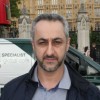Indian State Should Focus on Unconventional Methods: Jamal Nasir Baloch
Stepped-up Baloch activism troubles Pakistan

By Aveek Sen & Beebagr Baloch
Pakistan is scared about Marri’s visit to India as it is under pressure because of the indiscriminate use of its military muscle not just in Balochistan but even some Sindhi and Pashtun areas. It is afraid that the virus of resistance may spread.
There is a huge hue and cry in Pakistan over the India visit of the founder of the Free Balochistan Movement, Hyrbyair Marri. He is to attend an international conference on human rights. Pakistan is trying to link him with the BLA (Balochistan Liberation Army), an armed Baloch group fighting against the Pakistan army.
Islamabad misses the point that a recent verdict by a UK court has acquitted Marri and his aide Faiz Baloch from such charges levelled against them by Pakistan.
The demand for Marri’s extradition was struck down as Pakistan could not produce evidence against him to prove any of the allegations. Pakistan is now getting stretched in countering the Baloch all over the world. Its wishful thinking that all Baloch would remain in Balochistan where it can deal with them as it sees fit is no longer possible with a more and more interconnected world.
Earlier, many Baloch freedom fighters like Lala Munir, Sher Muhammad and Ghulam Mohammad were captured and eliminated by the Pakistani forces. Baloch veteran Nawab Akbar Khan Bugti was brutally killed in 2006. The other tactic used by Pakistan is the setting up of death squads like it did in pre-independence Bangladesh. These death squads enjoy the full support of the Pakistan Army and the ISI. Thousands of Baloch from all walks of life are missing, forcibly abducted and eliminated. Families of those missing, numbering more than 22,000, have been protesting for years but have not received a fair hearing within Pakistan.
Pakistan is scared about Marri’s visit to India and the reason is clear — the Pakistani state is under pressure because of the indiscriminate use of its military muscle not just in Balochistan but even in some Sindhi and Pashtun areas. It is afraid that the virus of resistance may spread from Balochistan to other ethnic groups. That is the reason for its concerted bid to link Marri with the Baloch armed group, the BLA. The fear of getting exposed in the eyes of the world is frustrating Pakistanis.
The human rights situation in Pakistan-occupied Balochistan, annexed in 1948, is of much concern throughout the world. Demonstrations and protests can be seen in many countries with an increased fervour and frequency. Balochistan achieved freedom from the British rule on August 11, 1947. The Balochistan First Chamber in its session, held in December 1947, unanimously approved the declaration of Balochistan’s independence; the Balochistan Upper House subsequently endorsed the First Chamber’s ruling in its session held in January 1948.
On March 27, 1948, Pakistan occupied Balochistan after a military invasion. Some parts were later detached and merged with Sindh and the rest named Balochistan province. But the Baloch see Pakistan as an occupying force. In the last 70 years, five Baloch uprisings – almost one every decade – have taken place to gain independence from Pakistan.
Pervez Musharraf was formally arrested by a police team from Balochistan in the Akbar Bugti murder case in 2013 and placed under a two-week judicial remand. However, the case hasn’t moved forward.
Balochistan is a no-go area for the international media.
Due to pressure from Pakistan and China, Switzerland denied political asylum to Baloch leader Brahumdagh Bugti and Mehran Marri from attending a UNHRC meeting.
Mehran Marri says the reason cited by the Pakistanis was that their names had been mentioned in an FIR filed in Pakistan after the attack on the Chinese consulate in Karachi this month. Both Mehran Marri and Brahumdagh Bugti have been labeled as militant leaders. The attempt is to stifle all Baloch political voices who are speaking about the human rights violations on the population by painting them as militants.
It has been seen that after every violent incident in Balochistan, Pakistan habitually names these three-four Baloch political leaders in an attempt to brand them as militants.
Pakistan also includes dictated reports in the media to damn these political leaders with the taint of militancy. The ISI has been active in persuading the US State Department to list leaders such as Hyrbyair Marri, Mehran Marri and Brahumdagh Bugti as purveyors of violence.
But Pakistan was shown the mirror at the last UN General Assembly meeting by Indian Foreign Minister Sushma Swaraj. Rebutting Pakistani allegations of India committing human rights violations in Kashmir, the minister responded by calling Pakistan the ‘godfather of terrorists’. Taliban’s Mullah Baradar and UN-designated terrorist Hafiz Mohammad Saeed roam freely in Pakistan, proving its collusion with terrorists operating under the garb of religion.
Pakistan has alleged that Hyrbyair Marri is wanted in Pakistan due to charges against him.
Pakistan should have no objection to a Baloch political leader engaged in a civic discourse in India. After all, Pakistani forums are open for all those Kashmiris who are speaking against India and some even have the blood of civilians on their hands. There should not be any hesitation among Indian peace-lovers and genuine well-wishers of Balochistan to host such figures.
Aveek Sen is a journalist working on cybersecurity and geopolitics of India’s neighbourhood
Beebagr Baloch is an activist of Free Balochistan Movement
Courtesy: The Tribune









